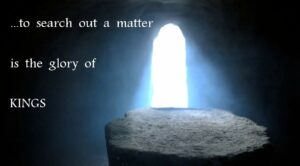Previous Post
A prophet of God is not merely someone who stands in the street or on the pulpit or wherever God has placed him or her declaring “Thus says the Lord”. God has created each and every person unique with different talents and skills, therefore within the prophetic, you will find various forms of expressions.
There is no general consensus regarding the number of expressions of the prophetic, but the reality is that there are various shades and colors within this calling and gifting. After all, there is generally not even consensus on the exact number of gifts of the Holy Spirit, or the natural abilities and giftings that the Lord bestows upon people.
What is important to understand is that there are a number of prophetic expressions, allowing people to express themselves prophetically within the parameters of their abilities and talents while staying true to who they are.
So even with the prophetic, it is about embracing your uniqueness. In God’s Kingdom, each of us is the Father’s favored son or daughter (Galatians 3:26-29). The unique mix of spiritual gifts He has given to us individually is like Joseph’s richly ornamented robe.
It says in “Romans 12:6: We have different gifts, according to the grace given to each of us”. To walk in one’s gift and prophetic expression is of vital importance, for it helps to remain true to God and oneself. Also remember that the Bible gives us principles that govern our ministry—for example, weighing up and accountability—that applies to every prophetic ministry, regardless of how it is expressed (1 Corinthians 14).
In the Old Testament, there are three Hebrew words translated into the English word “prophet” or “seer”. They are “nabi”, “roeh”, and “hozeh”. Nabi is the most generally used word for a prophet. It means “to bubble forth, as from a fountain,” hence “to utter.” We read examples of nabi prophets, “The Lord sent prophets amongst them to lead them back to Him. They warned the people…” (2 Chronicles 24:19) and, “The Lord said to Jeremiah: ‘Stand in the gate of the Lord’s temple and proclaim this message…’” (Jeremiah 7:1).
In the time of Samuel another word, “ro’eh”, meaning “seer”, began to be used and occurs seven times in reference to Samuel. We read, “Formerly in Israel, when a man went to inquire of God, he spoke thus: ‘Come, let us go to the seer’; for he who is now called a prophet was formerly called a seer” (I Samuel 9:9).
A seer typically receives prophetic revelation in dreams and visions and can also distinguish the messages of God embedded within creation. And then another word, “hozeh”, also means “seer” (2 Samuel 24:11), which is a synonym of “ro-eh” but a rarer Hebrew term that means “to see in a vision.” In 1 Chronicles 29:29, all these three words are used: “Samuel the seer (ro’eh), Nathan the prophet (nabi), Gad the seer” (hozeh).
So yes, there are different functions of the prophet, thus different expressions. It is also mostly centered on the prophet’s metron as well as how they primarily receive God’s voice. A metron is a Greek word that means measure or limited portion. The apostle Paul wrote, “We, however, will not boast beyond measure, but within the limits of the sphere which God appointed us…” (2 Corinthians 10:13).
Ministry identity, style, and motives all rest on the understanding of the ministry metron – the sphere God has drawn for you. And this also applies to the prophetic. We cannot go beyond such spheres, thus we remain within our calling/mandate.
Therefore it is important to remember there are different types of prophetic ministries in the Bible. After all, if you look at the lives of the Minor Prophets – Hosea, Joel, Amos, Obadiah, Jonah, Micah, Nahum, Habakkuk, Zephaniah, Haggai, Zechariah, and Malachi – you will find they were functioning differently in their callings. For example, Hosea was a prophet whom God used to portray a message of repentance to God’s people by allowing the prophet to marry a prostitute.
This prophetic expression was to demonstrate God’s great love for His people, comparing Himself to a husband whose wife has committed adultery. At the same time, we also must not limit God, and box Him in. We must flow with the Spirit, but at the same time not flow out of the Spirit by moving in the flesh and in our own will and imagination.
When it comes to the expression, consider how Isaiah as one of the leading prophets saw in the spiritual, as stated in chapter 6: “In the year that King Uzziah died, I saw the Lord sitting on a throne, high and lifted up, and the train of His robe filled the temple.”
Ezekiel also saw into the spiritual and his prophetic call dealt strongly with visions and mysteries, as evident in chapters 1, 10, 34, and 40 as a few examples. It says for example in “Ezekiel 10: 1 And I looked, and there in the firmament that was above the head of the cherubim, there appeared something like a sapphire stone, having the appearance of the likeness of a throne. 2 Then He spoke to the man clothed with linen, and said, “Go in among the wheels, under the cherub, fill your hands with coals of fire from among the cherubim, and scatter them over the city.” And he went in as I watched.”
So Isaiah and Ezekiel certainly saw many things of great mystery and things to come in the spiritual. This was also the case with Daniel. Yet, not all prophets are similar and not all prophets will “see” to such measure.
Of Daniel we read in Daniel 5:12: Inasmuch as an excellent spirit, knowledge, understanding, interpreting dreams, solving riddles, and explaining enigmas were found in this Daniel, whom the king named Belteshazzar, now let Daniel be called, and he will give the interpretation.”
In Jeremiah 13 we read: 1 This is what the Lord said to me: ‘Go and buy a linen belt and put it round your waist, but do not let it touch water.’ 2 So I bought a belt, as the Lord directed, and put it round my waist. 3 Then the word of the Lord came to me a second time: 4 ‘Take the belt you bought and are wearing round your waist, and go now to Perath and hide it there in a crevice in the rocks.’ 5 So I went and hid it at Perath, as the Lord told me. 6 Many days later the Lord said to me, ‘Go now to Perath and get the belt I told you to hide there.’ 7 So I went to Perath and dug up the belt and took it from the place where I had hidden it, but now it was ruined and completely useless. 8 Then the word of the Lord came to me: 9 ‘This is what the Lord says: “In the same way I will ruin the pride of Judah and the great pride of Jerusalem. 10 These wicked people, who refuse to listen to my words, who follow the stubbornness of their hearts and go after other gods to serve and worship them, will be like this belt – completely useless! 11 For as a belt is bound round the waist, so I bound all the people of Israel and all the people of Judah to me,” declares the Lord, “to be my people for my renown and praise and honour. But they have not listened.”
Talk about a unique expression of the prophetic! Jeremiah was called to wear a linen belt as a prophetic message. So with the prophetic, it is certainly not only about words. It is about prophetic actions. Take a look at Ezekiel 4: 1 ‘Now, son of man, take a block of clay, put it in front of you and draw the city of Jerusalem on it. 2 Then lay siege to it: erect siege works against it, build a ramp up to it, set up camps against it and put battering-rams around it. 3 Then take an iron pan, place it as an iron wall between you and the city, and turn your face towards it. It will be under siege, and you shall besiege it. This will be a sign to the people of Israel. 4 ‘Then lie on your left side and put the sin of the people of Israel upon yourself. You are to bear their sin for the number of days you lie on your side. 5 I have assigned you the same number of days as the years of their sin. So for 390 days you will bear the sin of the people of Israel. 6 ‘After you have finished this, lie down again, this time on your right side, and bear the sin of the people of Judah. I have assigned you 40 days, a day for each year. 7 Turn your face towards the siege of Jerusalem and with bared arm prophesy against her. 8 I will tie you up with ropes so that you cannot turn from one side to the other until you have finished the days of your siege. 9 ‘Take wheat and barley, beans and lentils, millet and spelt; put them in a storage jar and use them to make bread for yourself. You are to eat it during the 390 days you lie on your side. 10 Weigh out twenty shekels[b] of food to eat each day and eat it at set times. 11 Also measure out a sixth of a hin of water and drink it at set times. 12 Eat the food as you would a loaf of barley bread; bake it in the sight of the people, using human excrement for fuel.’ 13 The Lord said, ‘In this way the people of Israel will eat defiled food among the nations where I will drive them.’ 14 Then I said, ‘Not so, Sovereign Lord! I have never defiled myself. From my youth until now I have never eaten anything found dead or torn by wild animals. No impure meat has ever entered my mouth.’ 15 ‘Very well,’ he said, ‘I will let you bake your bread over cow dung instead of human excrement.’ 16 He then said to me: ‘Son of man, I am about to cut off the food supply in Jerusalem. The people will eat rationed food in anxiety and drink rationed water in despair, 17 for food and water will be scarce. They will be appalled at the sight of each other and will waste away because of their sin.”
Paul writes in Hebrews 11:32: “And what more shall I say? For the time would fail me to tell of Gideon and Barak and Samson and Jephthah, also of David and Samuel and the prophets.” Paul lumps David, Samuel, and the prophets in another group before recounting their and others’ exploits for God. We know David primarily as a warrior and king, yet he was also the sweet psalmist of Israel (II Samuel 23:1).
Beyond his historical exploits and the lessons we can learn from his full and complex life, David will also be remembered for his lasting contribution to the prophecies that he penned down as a psalmist. We read in 2 Samuel 23: 1 These are the last words of David: ‘The inspired utterance of David son of Jesse, the utterance of the man exalted by the Most High, the man anointed by the God of Jacob, the hero of Israel’s songs: 2 ‘The Spirit of the Lord spoke through me; his word was on my tongue.
A substantial number of David’s psalms are clearly prophetic, even some of those that seem, on the surface, to describe his own feelings of despair and abandonment during the low periods of his life.
With just a slight shift in perspective, they can often be seen as describing Christ’s struggles to master His own human nature and trust in God for deliverance. In fact, if we bring a prophetic eye to the reading of many of David’s psalms, we can perceive their predictive nature.
Perhaps the easiest way to see this is to survey one of his most clearly prophetic psalms, Psalm 22. Anyone familiar with the scourging and crucifixion of Jesus Christ can see the obvious parallels, and the writers of the gospel accounts—especially Matthew—bring them out through direct quotations of this psalm.
The psalm says: “1 My God, my God, why have you forsaken me? Why are you so far from saving me, so far from my cries of anguish? 2 My God, I cry out by day, but you do not answer, by night, but I find no rest. 3 Yet you are enthroned as the Holy One; you are the one Israel praises. 4 In you our ancestors put their trust; they trusted and you delivered them. 5 To you they cried out and were saved; in you they trusted and were not put to shame. 6 But I am a worm and not a man, scorned by everyone, despised by the people. 7 All who see me mock me; they hurl insults, shaking their heads. 8 ‘He trusts in the Lord,’ they say, ‘let the Lord rescue him. Let him deliver him, since he delights in him.’ 9 Yet you brought me out of the womb; you made me trust in you, even at my mother’s breast. 10 From birth I was cast on you; from my mother’s womb you have been my God. 11 Do not be far from me, for trouble is near and there is no one to help.” At least nine prophetic references in Psalm 22 tie directly to the suffering of Jesus Christ! Yes, David was a warrior king but he also had the heart after God (1 Samuel 13:14). So his prophetic expressions was the declaration of the heart of God!
Prophets thus do express themselves very differently at times as God leads and directs. Take also for example 2 Kings 5: Now Naaman was commander of the army of the king of Aram. He was a great man in the sight of his master and highly regarded because through him the Lord had given victory to Aram. He was a valiant soldier, but he had leprosy. 2 Now bands of raiders from Aram had gone out and had taken captive a young girl from Israel, and she served Naaman’s wife. 3 She said to her mistress, ‘If only my master would see the prophet who is in Samaria! He would cure him of his leprosy.’ 4 Naaman went to his master and told him what the girl from Israel had said. 5 ‘By all means, go,’ the king of Aram replied. ‘I will send a letter to the king of Israel.’ So Naaman left, taking with him ten talents of silver, six thousand shekels of gold and ten sets of clothing. 6 The letter that he took to the king of Israel read: ‘With this letter I am sending my servant Naaman to you so that you may cure him of his leprosy.’ 7 As soon as the king of Israel read the letter, he tore his robes and said, ‘Am I God? Can I kill and bring back to life? Why does this fellow send someone to me to be cured of his leprosy? See how he is trying to pick a quarrel with me!’ 8 When Elisha the man of God heard that the king of Israel had torn his robes, he sent him this message: ‘Why have you torn your robes? Make the man come to me and he will know that there is a prophet in Israel.’ 9 So Naaman went with his horses and chariots and stopped at the door of Elisha’s house. 10 Elisha sent a messenger to say to him, ‘Go, wash yourself seven times in the Jordan, and your flesh will be restored and you will be cleansed.’ 11 But Naaman went away angry and said, ‘I thought that he would surely come out to me and stand and call on the name of the Lord his God, wave his hand over the spot and cure me of my leprosy. 12 Are not Abana and Pharpar, the rivers of Damascus, better than all the waters of Israel? Couldn’t I wash in them and be cleansed?’ So he turned and went off in a rage. 13 Naaman’s servants went to him and said, ‘My father, if the prophet had told you to do some great thing, would you not have done it? How much more, then, when he tells you, “Wash and be cleansed”!’ 14 So he went down and dipped himself in the Jordan seven times, as the man of God had told him, and his flesh was restored and became clean like that of a young boy. 15 Then Naaman and all his attendants went back to the man of God. He stood before him and said, ‘Now I know that there is no God in all the world except in Israel. So please accept a gift from your servant.’
The prophetic was established through an act of dipping seven times in the Jordan River! And the prophetic action produced a testimony to glorify God. Such is the nature and the glory of God. Elisha also took pity on a widow and her son, causing a magic pot of oil to multiply, so that she could sell some and pay off her debts (2 Kings 4:1–6). For his next miracle, Elisha brought a boy back to life by lying on him and calling on the Lord (2 Kings 4:34–35; cf Acts 20:10).
Not content with multiplying food once, Elisha then fed a hundred men from a small pot of food—an apparent forerunner of the story of Jesus feeding thousands. Elijah the prophet also did many miracles, which included calling for a drought (1 Kings 17:1), meal and oil multiplied (1 Kings 17:14), child restored to life (1 Kings 17:22), sacrifice consumed by fire (1 Kings 18:38), captains and men were slain by fire (2 Kings 1:10), the rain ended the drought (1 Kings 18:41) and water of Jordan divided (2 Kings 2:8).
We also read the story in 2 Kings 6: Elisha traps blinded Arameans. 8 Now the king of Aram was at war with Israel. After conferring with his officers, he said, ‘I will set up my camp in such and such a place.’ 9 The man of God sent word to the king of Israel: ‘Beware of passing that place, because the Arameans are going down there.’ 10 So the king of Israel checked on the place indicated by the man of God. Time and again Elisha warned the king, so that he was on his guard in such places. 11 This enraged the king of Aram. He summoned his officers and demanded of them, ‘Tell me! Which of us is on the side of the king of Israel?’ 12 ‘None of us, my lord the king,’ said one of his officers, ‘but Elisha, the prophet who is in Israel, tells the king of Israel the very words you speak in your bedroom.’ 13 ‘Go, find out where he is,’ the king ordered, ‘so that I can send men and capture him.’ The report came back: ‘He is in Dothan.’ 14 Then he sent horses and chariots and a strong force there. They went by night and surrounded the city. 15 When the servant of the man of God got up and went out early the next morning, an army with horses and chariots had surrounded the city. ‘Oh no, my lord! What shall we do?’ the servant asked. 16 ‘Don’t be afraid,’ the prophet answered. ‘Those who are with us are more than those who are with them.’ 17 And Elisha prayed, ‘Open his eyes, Lord, so that he may see.’ Then the Lord opened the servant’s eyes, and he looked and saw the hills full of horses and chariots of fire all round Elisha. 18 As the enemy came down towards him, Elisha prayed to the Lord, ‘Strike this army with blindness.’ So he struck them with blindness, as Elisha had asked.
Moses of course also performed numerous miracles, or technically God performed the miracles through the prophet, including the 10 plagues. We read for example in Exodus 4: 1 Then Moses answered and said, “But suppose they will not believe me or listen to my voice; suppose they say, ‘The Lord has not appeared to you.’ ” 2 So the Lord said to him, “What is that in your hand?” He said, “A rod.” 3 And He said, “Cast it on the ground.” So he cast it on the ground, and it became a serpent; and Moses fled from it. 4 Then the Lord said to Moses, “Reach out your hand and take it by the tail” (and he reached out his hand and caught it, and it became a rod in his hand), 5 “that they may believe that the Lord God of their fathers, the God of Abraham, the God of Isaac, and the God of Jacob, has appeared to you.” 6 Furthermore the Lord said to him, “Now put your hand in your bosom.” And he put his hand in his bosom, and when he took it out, behold, his hand was leprous, like snow. 7 And He said, “Put your hand in your bosom again.” So he put his hand in his bosom again, and drew it out of his bosom, and behold, it was restored like his other flesh. 8 “Then it will be, if they do not believe you, nor heed the message of the first sign, that they may believe the message of the latter sign. 9 And it shall be, if they do not believe even these two signs, or listen to your voice, that you shall take water from the river and pour it on the dry land. The water which you take from the river will become blood on the dry land.”
Moses was at the Red Sea when it parted and in the wilderness when the Lord provided manna and quail supernaturally. Moses was not just a prophet who dealt with the power of God, and who saw many signs, wonders, and miracles. He was also a prophet who received and initiated the 613 Laws of Moses, and he also administered and taught the Law. As a prophet, he would lead the people out of bondage but sadly never saw the Promised Land.
The Talmud holds that the Torah (which signifies the first five books of the Hebrew Bible, also called the Law or the Pentateuch) was written by Moses, with the exception of the last eight verses of Deuteronomy, describing his death and burial, being written by Joshua. Moses’ prophetic expression manifested thus in many different ways, including the organizer of the community’s religious and civil traditions. His influence continues to be felt in the religious life, moral concerns, and social ethics of Western civilization, and therein lies his undying significance.
Samuel was another such great prophet of important stature, and many prophets of today fall into his expressions of a prophet. Such Samuel prophets reportedly occupy a high-ranking prophetic office, operating in a strong level of wisdom and discernment. Based on the experiences of Samuel, they are seen as a prophet that pours into people their skills, styles, values, strategies, and experiences. It is said they also carry an apostolic anointing, considering Samuel anointed kings and advised them. Samuel was an advisor, and certainly guided and steered the government of the time.
Samuel’s prophetic ministry is significant because it begins at a time when words from the Lord are rare and infrequent (1 Samuel 3:1). He was placed under the care and training of Eli, the priest, and judge of Israel at that time (1 Samuel 1:9; 4:18). But after Samuel, Israel’s history comes alive with prophetic revelation: much of which is recorded in the prophetic books of the Bible. Like the mighty Samson, Samuel is dedicated to the Lord as a child. This dedication was for life (1 Samuel 1:11, Numbers 6:1–21). Like Samson, he, therefore, did not shave his hair, but again, this does not mean every prophet must never put a razor to their scalp or face!
In addition to teaching Samuel about God and His instructions, Eli gave the child Samuel light duties around the tabernacle, such as opening its doors (1 Samuel 2:18; 3:15). It was during this time when Samuel was still a child that God began to speak to him. Samuel’s first message from God was quite sobering and was to be delivered to Eli, the aging leader of Israel. Samuel was to announce God’s punishment on Eli’s two wayward sons, Hophni and Phinehas, who were abusing their priestly authority over the people and desecrating the sacrificial offerings (1 Samuel 2:27-34; 3:2-18). God also severely reprimanded Eli for his tolerance of his son’s behavior. Because of the disrespect shown to God, God told Eli that his descendants would die in “the flower of their age” and that He would choose another family to serve in the priestly line (1 Samuel 2:33-35).
Samuel was thus taught in the ways of God and learned from young to discern the voice of God. This is of course vital for the prophetic, no matter the expression. A prophet needs to discern the voice of God in order to act upon it. A prophet needs to grow in God’s majesty and presence. As Samuel grew and faithfully conveyed messages from God, it became obvious that God was working through him. “And all Israel from Dan to Beersheba knew that Samuel had been established as a prophet of the Lord” (1 Samuel 3:20). Samuel was referred to as a “seer” (1 Chronicles 9:22), another name for prophet.
A seer meant one who sees, as in one who receives God’s revelation. The people of Israel consulted Samuel on difficult subjects (1 Samuel 9:6-10), and the elders trembled before him as the representative of God’s authority (1 Samuel 12:18; 16:4-5). Yet in his great concern for the nation, at times he would be in deep intercessory prayer for them (1 Samuel 7:7-8; 15:11).
Samuel’s prophetic mantle expressed thus in many ways, as he was also the instrument God used to anoint the first two physical kings of Israel, Saul and then David (1 Samuel 9:15-16; 16:1). Samuel cared for Saul and served as an instructor to him in his early years of kingship (1 Samuel 9:25; 10:25). Later when Saul overstepped his kingly authority and disregarded God’s commands, God spoke through Samuel to tell Saul that he was rejected as king over Israel (1 Samuel 15:26). God then sent Samuel to anoint young David to be Israel’s next king. For a number of years, David was close to Samuel, able to learn from his guidance and experience (1 Samuel 19:18).
Another of Samuel’s leadership roles was that of the chief judge of Israel after Eli, his predecessor, died. Much earlier, in the time of Moses, God established the office of the judge. Moses served as a judge of Israel, deciding cases between people and teaching God’s statutes (Exodus 18:16; Numbers 11:16). Under this system, there would be a chief judge and appointments of local judges for the towns and cities of Israel (Exodus 18:21-22).
During the period of the judges, a judge was often a military champion or a deliverer that God would appoint to win victories over Israel’s enemies. Some familiar military judges included Joshua, Gideon, Deborah, and Samson. Samuel fulfilled a more general sense of a judge, being a person carefully selected by God for his integrity and skill to decide legal cases for the people.
Thus, the prophetic expressions of Samuel, like Moses for example, were manifold. It should serve as a reminder that a prophet does not necessarily move within a strict jurisdiction of duties or expressions, but a prophet can move in veracious giftings and abilities, which form part of the prophetic to fulfill the prophetic mantle and calling. Also, take note while Samuel grew up in the house of the Lord that Moses grew up in the house of a King. Thus the training for prophets differs, especially under different circumstances, but God uses the training to sharpen the skills and the expressions of the prophet.
As with Moses, there are those who are seen as prophets moving more in the realm of God’s power, or in signs and wonders and miracles. They have such authority to shut the heavens, make the sun stand still, cause drought, send fire from heaven, send dew, and more.
They operate strongly in the gift of faith and the working of miracles. We saw Elijah for example personally shut heaven (1 Kings 17:1) and Joshua made the sun stand still (Joshua 10:12-13). Again, this is a prophetic expression not found with all prophets. Such prophets are action prophets, their ministries are confrontational. Moses as mentioned was a man who was called forth to bring redemption to the Israelites.
Interestingly enough, there were other “prophets” in the Pentateuch, even though it may not always appear so. Some were not actually called prophets, but they do appear to have had a prophetic ministry. Noah, for example, is called a “preacher of righteousness” in 2 Peter 2:5. His lengthy building project (the ark) was surely a visible warning of the divine judgment that was about to come upon the whole world. Thus a prophetic action.
Joseph interpreted Pharaoh’s dreams (Genesis 41) and his own (Genesis 42:8), and the message of both was clearly prophetic. Jacob prophesied concerning the destiny of his sons (Genesis 49). While Moses did not refer to Enoch as a prophet in the Pentateuch, the New Testament Book of Jude speaks of his prophecy (Jude 1:14-15). Miriam, the sister of Moses, is identified as a prophetess by Moses (Exodus 15:20).
And then, you get revealing prophets, the Seers, who have the ability to see into dimensions. These prophetic graces operate outside of the dimension of time. They see into events with precision and accuracy. Revealing prophets see, hear and witness heavenly activities, engage angelic beings, and operate in a high level of the word of knowledge.
Every now and again, the Lord will trans relocate these prophets into supernatural realms to see what He has for His people. When the Lord allows this, they see what has never been revealed because these prophets flow outside our time constraints. Revealing prophets can flow between dimensions. The revealing prophet only sees, hears, and feels when the Lord gives him/her access. When the Lord does, it’s precise.
Revealing prophets are thus those prophets who reveal things that are past, things in time, and things to come. The story of Elisha and Ghazi comes to mind. “And Elisha prayed, and said, “Lord, I pray, open his eyes that he may see.” Then the Lord opened the eyes of the young man, and he saw. And behold, the mountain was full of horses and chariots of fire all around Elisha (2 Kings 16:17).
Elisha saw into deep realms that cannot be seen with the physical eyes. Such prophets have therefore the gift of sight and thus are wired to see. Their eyes are their gifting to the body of Christ. Prophets like Daniel, Joshua, and Jeremiah also possessed revelatory mandates to see. Both Daniel and Joseph were summoned before kings; they used their revelatory abilities to reveal what was to come.
And then, some prophets deal with the realm of knowledge. Knowledge can relate to actual events in the past, present or future—knowledge of the future being ‘foretelling’. In his list of gifts of the Spirit, Paul refers to a ‘word of knowledge’ (1 Corinthians 12:8).
Samuel was a prophet who operated in the realm of knowledge. In 1 Samuel 9, he tells Saul the donkeys he lost three days earlier are found (knowledge of past). He tells Saul he will shortly meet a party who will inform Saul his father is now worried about him (present and future knowledge). He then goes on to instruct Saul concerning his kingship. (1 Samuel 10)
There are those prophets who deal strongly in the gift of writing. Many prophets in the Bible were writing prophets. We know this because some prophets were used by God to write Scripture. Of these, some, such as Habakkuk, were poets. But not all prophets recorded their words in writing. The Prophet (ess) Huldah gave verbal prophetic counsel in 2 Kings 22:14-20.
Thus some prophets are involved in just utterances. Jeremiah was called to be a prophetic voice: ‘…Behold, I will make My words in your mouth fire, and this people wood, and it shall devour them’ (Jeremiah 5:14, NKJV). The prophetic utterances of Haggai and Zechariah were timely exhortations that encouraged the Jewish leaders to rebuild the temple (Ezra 5:1-2).
And then some prophets are strongly linked to prophetic prayer and intercession. Daniel is one whose life was characterized by prayer, fasting, and intercession. (Daniel 6:10, Chapter 9). In the New Testament, we meet Anna, a prophetic intercessor who meets the answer to her prayer in the young child Jesus (Luke 2:36-38).
And then some prophets are involved more in arts and they are thus creative: The Holy Spirit used the Prophet Ezekiel in prophetic acts that were creative and dramatic in nature. In Ezekiel 4 and 5, he uses prophetic sculpture and art, along with drama, to portray the coming judgment on Jerusalem. Some prophets are involved in prophetic worship and music.
Remember some of the Psalms are prophecies that were originally set to music. King David as mentioned was a prophetic Psalmist and musician. We read, ‘David, together with the commanders of the army, set apart some of the sons of Asaph, Heman, and Jeduthun for the ministry of prophesying, accompanied by harps, lyres, and cymbals.’ (1 Chronicles 25:1, NIV). The prophet(ess) Deborah wrote a song (recorded in Judges 5). In Exodus 15:20 we read, ‘Then Miriam the prophetess, the sister of Aaron, took the timbrel in her hand; and all the women went out after her with timbrels and with dances’.
There are those prophets whose expressions deal strongly in dreams, pictures, and interpretation. Some visions and prophecies are dramatically figurative and obscure, notably those in the Old Testament books of Ezekiel and Daniel and the book of Revelation at the end of the New Testament. These generally relate to the apocalypse and concern the judgment at the end of the world.
The first recorded dream in the Bible is that of Jacob. On the night he ran away from home, he dreamed he saw a stairway to heaven, usually referred to as Jacob’s Ladder, with angels going up and down (Genesis 28:12).
Joseph (son of Jacob), is one of the best-known interpreters of dreams in the Old Testament. Joseph started interpreting dreams when he was quite young. He caused trouble with his eleven brothers when he told them that he had dreamed that he saw the sun, the moon, and eleven stars (i.e. the members of his family) bowing down to him (Genesis 37:9).
When his brothers subsequently sold him into slavery in Egypt, Joseph came into a position to be able to interpret dreams for the ruler, Pharaoh. These dreams foretold the coming of seven years of good harvest followed by seven years of famine and therefore enabled the Egyptians to prepare for the coming emergency (Genesis 41:16-36).
His ongoing prophetic ministry was very pictorial in nature. Just as the book of Revelation is a very descriptive book of the prophetic vision given to the Apostle John. The ministry of Ezekiel is also characterized by vision.
Daniel is also well known as an interpreter of dreams. For him, the task was more challenging than for Joseph. King Nebuchadnezzar commanded the interpreters to tell him what he had dreamt, as well as what it meant! Daniel prayed, and God revealed the dream to him in a vision in the night (Daniel 2:19). The outcome was not only an honor for Daniel but the king’s acknowledgment that ‘Surely your God is the God of gods and the Lord of kings and a revealer of mysteries’ (Daniel 2:27-45).
Both Joseph and Daniel attributed to God their ability to interpret dreams. Daniel was gifted by God to understand and interpret dreams and visions. ‘…Daniel…was found to have a keen mind and knowledge and understanding, and also the ability to interpret dreams, explain riddles and solve difficult problems’ (Daniel 5:12, NIV, see also Daniel 1:17).
Daniel not only interpreted the dreams of others; he personally received dreams and visions from God concerning the future. Daniel chapter 7 is one example of a dream given to Daniel. Joel 2:28 says: “And it shall come to pass afterward, that I will pour out my Spirit on all flesh; your sons and your daughters shall prophesy, your old men shall dream dreams, and your young men shall see visions.”
Truth is, dreams and visions in the ancient Near East were seen as offering insights into everyday realities or providing opportunities to transcend them by connecting the earthly and otherworldly, the lived present and the unknown future.
They predicted events, personal and cosmic, as in Abraham’s vision in the night (Genesis 17), the prophet Micaiah’s prebattle vision (1 Kings 22), and Daniel’s dream vision of the four beasts (Daniel 7). They also serve as warnings or directives, as in the dreams of Pharaoh (Genesis 41) and Abimelech (Genesis 20:3-7) or the visions of Amos (Amos 7:7-9, Amos 8:1-3) and Jeremiah (Jeremiah 1:11-19, Jeremiah 24).
Many visionary experiences were understood as divine revelations. What is interesting is that God could lead as well as mislead, according to biblical perception. For example, Micaiah learns that God himself is going to send a lying spirit to the prophets in order to achieve the death of King Ahab (1 King 22:20-23).
Some biblical texts recognize that those who dream may misinterpret their dreams or even make them up (Deuteronomy 13:5); perhaps this is why some biblical texts express a marked preference for direct word oracles (Numbers 12:6-8).
Thus throughout the Bible, there are numerous examples of men and women receiving messages they believe to be from God, either for themselves or to pass on to others. As mentioned these messages sometimes came through the medium of a vision or dream, or as a prophecy, which are inspired utterances, sometimes predicting future events.
In the New Testament, an angel of the Lord appeared to Joseph (the carpenter), who was engaged to be married to Mary. In a dream, the angel told Joseph not to reject Mary because she was pregnant, but to take her as his wife, since her child would be the prophesied Saviour (Matthew 1:20-21). Both Joseph and the wise men who came to visit the baby Jesus were warned in dreams to escape to avoid the murderous intentions of King Herod Antipas (Matthew 2:12-13). Was Joseph thus prophetic? Most likely.
You will also find Luke recounting visions of angels appearing to speak to Zechariah, Mary, and the shepherds, in each case bringing them important news. Zechariah was told to name his son John; Mary was told she would have a child who was God’s son; the shepherds were told the news of the birth of Jesus (Luke 1:11; Luke 1:26-28; Luke 2:9-14).
One will find many prophetic texts intermingle the auditory and the visionary: the prophet sees a vision and information is verbally revealed within it. These visions use a variety of commonly recognized motifs, such as dining with the deity, the presence of smoke and seraphs, and the deity enthroned. Some dreams and visions described in the Hebrew Bible, like those of Pharaoh, Amos, Jeremiah, Zechariah, and Daniel, communicate via symbols that must be interpreted to be understood; others, like the one attributed to Isaiah, are more direct in their message. Thus, great discernment is required.
The Old Testament prophet Joel brought the message: ‘Afterwards, I will pour out my Spirit on all people. Your sons and daughters will prophesy, your old men will dream dreams, your young men will see visions’ (Joel 2:28).
So are dreams and visions only for the prophetic? No. It is clear by the Spirit of the Lord anyone in the Body of Christ may see visions and dreams. What is important is to understand them, and to correctly discern when it is God speaking or it is a dream or a vision that flows from one’s soul (conscious or unconscious mind).
After all, on the Day of Pentecost, when the Holy Spirit came upon the disciples in tongues of fire, with a rushing wind (Acts 2:1-21) Peter explained to the crowds that Joel’s prophecy was being fulfilled. So yes, we are living in the days of dreams and visions. And for some prophets, this is their mode of reviving God’s message.
And lastly, you will some who are strong prophetic teachers and preachers. Moses was both a prophet and a teacher (Deuteronomy 18:15, 34:10) He wrote, ‘Give ear, O heavens, and I will speak; And hear, O earth, the words of my mouth. Let my teaching drop as the rain, my speech distill as the dew…’ (Deuteronomy 32:1-2a, NKJV). Silas in the New Testament was a prophet who, along with Judas strengthened and encouraged the church ‘with many words.’ (Acts 15:32). He later preached alongside Paul on his missionary trips (Acts 15:40, 17:14).
So yes, the prophetic is very unique, diverse, interesting, exciting, and very much alive with potential and expression! To be true to the expression one needs to be true to God so that the expression is God-ordained and not fleshly driven or orchestrated. A truly God-ordained expression of the prophetic carries God’s authority and anointing, and it will be an expression of God’s heart and God’s will.
Next Post







